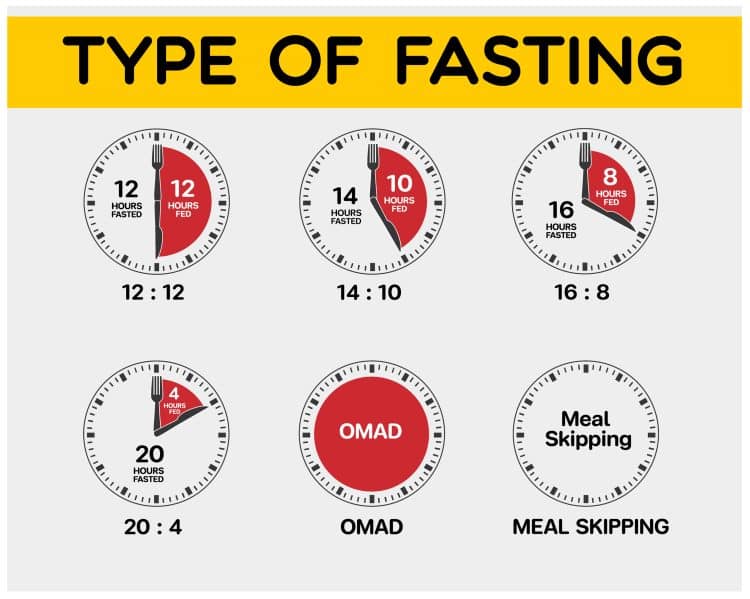Intermittent fasting is a dietary trend where you alternate between periods of fasting and eating. It has become a popular trend in recent years as people seek ways to improve their health and lose weight. However, recent studies indicate that women do not respond the same way to intermittent fasting as men.
Research also shows that intermittent fasting affects women’s bodies differently. The hormonal fluctuations in a woman’s body make it more challenging. A pertinent question in this respect is — can women practice intermittent fasting while on their periods?
This article explores in detail the topic of intermittent fasting and periods, including the potential benefits and risks, as well as some tips for practicing intermittent fasting during menstruation.
Should You Intermittent Fast on Your Period?
You can do intermittent fasting during your period, but it isn’t as straightforward. It depends on your preference and, more importantly, your body’s response to intermittent fasting. Some may be able to continue fasting without adverse effects, while others may experience menstrual irregularities or increased discomfort.
A study on the effect of intermittent fasting on reproductive hormone levels found that fasting doesn’t impact women’s estrogen, prolactin, or gonadotropin levels. [1]
Another study by the Department of Gynecological Endocrinology, Poznan University of Medical Sciences, found that weight loss factors can hurt gonadotropins, resulting in amenorrhea and infertility. Gonadotropins are responsible for moderating the follicular and luteal phases. [2]
If you are considering intermittent fasting during your period, learn to listen to your body. Pay attention to any changes in your menstrual cycle or symptoms. If you notice any irregularities or discomfort, modify your fasting routine or take a break from fasting during your period.
What Happens During the Menstrual Cycle?
The menstrual cycle makes pregnancy possible. It starts on the first day of menstruation and ends just before the next menstrual cycle, lasting between 24 to 38 days. The process itself is complex and involves the constant interaction of hormones, namely:
- Luteinizing hormone
- Follicle-stimulating hormone
- Estrogen
- Progesterone
The menstrual cycle has four phases: the menses phase, the follicular phase, the ovulatory phase, and the luteal phase.
Menses Phase
The menses phase is the first five days of your menstrual cycle when your uterus sheds its old lining in the absence of a pregnancy. This shedding results in the release of blood and other fluids through the vagina.
Although a period lasting 3-5 days is typical, some bleed for seven days; it generally is not a cause for worry. However, you’ll experience low hormone levels and decreased energy.
Follicular Phase
The next phase lasts nine days from days 6-14; it is called the follicular phase. During this phase, the estrogen levels slowly rise, thickening the uterus lining in preparation for a potential pregnancy. In addition, the pituitary gland also releases the follicle-stimulating hormone (FSH), stimulating the growth and maturation of follicles in the ovaries.
Ovulatory Phase
The ovulatory phase occurs around day 14 of the menstrual cycle when one of the follicles releases an egg into the fallopian tube. This process is triggered by a luteinizing hormone (LH) surge, which causes the follicle to rupture and release the egg.
Luteal Phase
The luteal phase begins right after ovulation and lasts about 14 days, from day 15 to day 28, when a mature egg leaves the ovary on its journey to the uterus through the fallopian tubes. During this phase, the empty follicle changes into the corpus luteum, which releases progesterone.
Progesterone helps prepare your uterus lining for the implantation of a fertilized egg. If fertilization does not occur, the thickened uterine lining is shed during menstruation. As a result, estrogen and progesterone levels also drop.
How Does Intermittent Fasting Affect the Menstrual Cycle?
There is limited research on the effects of intermittent fasting on the menstrual cycle, but some studies suggest that it may disrupt the average hormonal balance and menstrual function. For example, one study found that women who practiced fasting for more than 15 days during Ramadan had a higher risk of menstrual irregularities, including amenorrhea (absence of menstruation), oligomenorrhea (infrequent menstruation), and dysmenorrhea (painful menses). [3]
Another study shows that short-term fasting can cause a dip in luteinizing hormone levels in women of normal weight. [4]
One potential explanation for changes in menstrual cycles with intermittent fasting is calorie restriction and weight loss. Reducing the overall caloric intake results in fluctuating hormone levels, specifically estrogen, progesterone, and other hormones that regulate the menstrual cycle. With the menstrual cycle disrupted, you can see changes in the length and regularity of periods.
Another critical point to take into consideration is stress. Calorie restriction and time-restricted eating can place undue stress on your body, which can, in turn, affect menstrual cycles. As a result, some women may experience irregularities in their menstrual cycle.
While the studies mentioned above suggest a possible link between intermittent fasting and the menstrual cycle, more research must be done to understand this relationship fully.
Additionally, the impact of intermittent fasting on the menstrual cycle may vary from person to person, and other factors, such as exercise, may also play a role.
If you experience significant changes in your menstrual cycle while practicing intermittent fasting, speak with a healthcare provider. They can help determine the underlying cause and ensure that you receive appropriate care.
How to Fast During Different Stages of Your Menstrual Cycle?
The ever-changing hormones make intermittent fasting more complex and challenging for women than men. Research by Proctor and Gamble stated that the menstrual cycle is highly intrinsically linked to the body’s cognitive, emotional, and sensory functions. [5]
These studies prove that hormonal health is vital for physical and mental well-being, referred to as “cycle syncing.” Cycle syncing is when you modify your diet to match your menstrual cycle. Here’s how you should fast and eat during the different phases of your menstrual cycle.
Menstrual Phase (Days 1-5)
On days 1–5, the body is already under stress, so it may be best to avoid fasting altogether. Instead, focus on eating nutrient-dense foods that will help support your body, such as leafy greens, healthy fats, and lean proteins. Also, add foods rich in iron and magnesium to soothe cramping.
Follicular Phase (Days 6-14)
During the follicular phase, estrogen levels rise, and the body prepares for ovulation. Your insulin sensitivity is at its best during this time. This is an excellent time to experiment and push your body with extended fasting periods. Owing to the heightened insulin sensitivity, longer periods of fasting can help with weight loss.
Ovulatory Phase (Days 14, 15)
The ovulatory phase is the peak of estrogen and testosterone levels, which can increase energy levels and reduce hunger. Furthermore, ovulation also results in a higher body temperature and increased testosterone levels.
Your body is also equipped to handle the stress of fasting. So you can try a longer fast, such as a 24-hour fast. Shifting toward higher protein and lower carbohydrate foods is recommended during this phase.
Luteal Phase (Days 15-28)
After ovulation is the luteal phase; during this period, progesterone levels continue to rise. The elevated progesterone levels lead to increased hunger and cravings.
During this period, you are ill-equipped to handle longer fasts. So focus on shorter fasting periods or time-restricted eating. Avoid prolonged fasting and switch to high-protein meals.
Moreover, as the luteal phase progresses, around day 22, there’ll be a decrease in insulin sensitivity. So, diabetic patients will want to monitor their dietary habits accordingly. This period is also called PMS, and during this time, it’s important to prioritize self-care and engage in gentle exercises and stress-relieving activities.
Incorporate soothing beverages like peppermint tea or caffeine-free chai latte, which can help manage cravings. If you desire a treat, consider consuming a piece of dark chocolate.
Tips for Intermittent Fasting on Your Period
Intermittent fasting presents many benefits, such as improved insulin sensitivity and weight loss. However, it can be challenging to fast while on your period. Here are some tips to help you navigate intermittent fasting during menstruation.
Listen to Your Body
Pay attention to how your body feels and adjust your fasting schedule if necessary. Your body may have different needs during your menstrual cycle. If you feel particularly hungry or tired, consider breaking your fast early or taking a break from fasting altogether.
Adjust Your Fasting Schedule
If your menstrual cycle affects your fasting ability, you may need to adjust your fasting schedule during your period. For example, you could shorten your fasting window or try a more relaxed approach.
If you usually fast for 16 hours per day, consider shortening your fasting window to 14 or 12 hours during your period. Or not fast at all, which is perfectly fine.
Include Nutrient Dense Foods
When you break your fast, ensure you’re consuming nutrient-dense foods. Focus on eating protein, healthy fats, and complex carbohydrates for sustained energy and satiety.
For example, Greek yogurt with raspberries and coconut flakes, a protein-rich smoothie, or an egg scramble with avocado. These foods can help give your body the nutrients it needs to support your menstrual cycle.
Furthermore, you may have to increase your fat intake to help manage cravings during your period.
Drink Plenty of Water
It’s essential to keep yourself hydrated during your period, especially if you are fasting. This helps reduce the general symptoms of menstruation, including bloating and cramps. In case of discomfort, incorporate herbal tea or warm water with lemon.
Avoid Processed Foods and Sugary Drinks
Processed foods and sugary drinks can worsen menstrual symptoms such as bloating, cramps, and mood swings. Rather than processed foods, opt for whole foods that nourish your body and promote overall health.
Practice Self-Care
Your body is going through a tough time with fluctuating hormones during periods. It is okay to stop and take a break from fasting if needed.
Listen to your body and rest if you feel like it.
Consult with a Health Care Professional
If you have a history of menstrual irregularities or other reproductive health issues, talk to your doctor before starting an intermittent fasting routine. They can offer advice and support to help you make the best decisions for your health.
Frequently Asked Questions
Does intermittent fasting have side effects on periods?
Intermittent fasting can affect the menstrual cycle in women, mainly due to calorie restriction. Extended fasting can interfere with the function of the hypothalamus, a part of the brain that plays a vital role in regulating hormones, such as estrogen, which are essential to the menstrual cycle.
Can fasting make your period flow heavier?
Intermittent fasting can affect periods and cause abnormal cycles, either heavy or light. Fasting can also cause hormonal changes and exacerbate already occurring issues.
What should I eat while intermittent fasting during my period?
Focus on consuming nutrient-dense foods such as fruits, vegetables, whole grains, and lean proteins while fasting during your period. These foods can help give your body the nutrients it needs to support your menstrual cycle.
Conclusion
Intermittent fasting can be a wholesome dietary approach owing to its many benefits, such as improved insulin sensitivity, weight loss, and many more. First, however, it is important to consider its potential effects on the menstrual cycle and listen to your body’s needs.
While there is limited research on the relationship between intermittent fasting and menstrual function, recent studies state that fasting does not have a lasting effect on hormone levels. On the other hand, some studies suggest that it may disrupt normal hormonal balance and increase the risk of menstrual irregularities.
In saying that, you can practice intermittent fasting during your period, provided you listen to your body. Ensure you stay hydrated, choose nutrient-dense foods, and consider shortening your fasting window if necessary. And as always, it is important to talk to your doctor before starting any new dietary approach.
References
Fitness Volt is committed to providing our readers with science-based information. We use only credible and peer-reviewed sources to support the information we share in our articles.
- Cognitive, sensory, and emotional changes associated with the menstrual cycle: a review – PubMed. (2008, October 1). PubMed.
- Short-term fasting affects luteinizing hormone secretory dynamics but not reproductive function in normal-weight sedentary women – PubMed. (1995, April 1). PubMed.
- Yavangi, M., Amirzargar, M. A., Amirzargar, N., & Dadashpour, M. (n.d.). Does Ramadan fasting has any effects on menstrual cycles? PubMed Central (PMC).
- Functional hypothalamic amenorrhea and its influence on women’s health – PubMed. (2014, November 1). PubMed.
- Cienfuegos, S., Corapi, S., Gabel, K., Ezpeleta, M., Kalam, F., Lin, S., Pavlou, V., & Varady, K. A. (2022, June 3). Effect of Intermittent Fasting on Reproductive Hormone Levels in Females and Males: A Review of Human Trials. PubMed Central (PMC).













